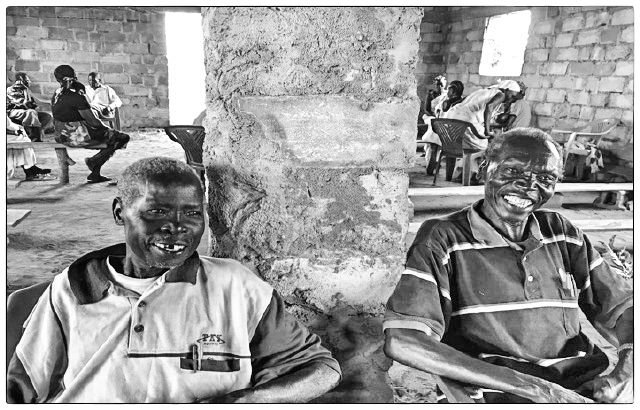This blog post was written by our CEO, Rachel Lindley upon her return from visiting our new programme starting in the Democratic Republic of Congo (DRC).
Crossing the land border from Uganda into DRC was underwhelming. The border was a piece of rope held by two young men, and as we waited for the inevitable paperwork, the landscape was surprisingly dull. There was none of the usual cross-border trade, bustle and bargaining. Not a single overladen truck, motorbike or even bicycle, no kiosk selling mobile phone top-ups, Coke and sun-bleached biscuits, nothing.
Passports eventually stamped, we drove off into DRC. The contrast with the Ugandan town we'd just left behind was stark. Behind us, a thriving metropolis, with tarmac roads, men, women and children heading to work and school with all the hustle and bustle of every day life in a busy town. Just a mile away in DRC, life could not be more different. I noticed the silence first. No dust - no traffic apart from bicycles. The tarmac main road from the border was built by one of the gold mining firms, but otherwise the roads are all unmade. There is no electricity except from generators or solar panels, no advertising, no mobile money or airtime kiosks and very few roadside businesses, even the most informal.
People in Aru live on the edge in more ways than one. They are on the edge of DRC, just a few miles from Uganda, and many have fled there when conflict and violence have erupted. Decades of civil war in the region mean communities have experienced hideous atrocities as well as famine and sickness that come from fleeing your land and home. As we write, thousands have fled their homes just 100 miles south of Aru, to escape violent machete attacks, raping and looting. Thousands more risk starvation.
I received a warm welcome in a village in Aru, DRC
Thankfully, Aru itself is currently peaceful, and the communities we met could not have been more welcoming - nor more desperate for our programme to begin. Most NGOs are working in the conflict zones, where the need for disaster relief is urgent. But in Aru, people urgently need a way to boost the local economy, increase the number of small businesses, build some savings in case of emergencies and support their children to go to school.
Our programme will integrate literacy training because so many adults missed out on schooling during the years of civil war, and trauma counselling to help adults and children come to terms with the attrocities they have seen and experienced. Despite the horrors in the past, Aru is a place of hope - living on the edge of opportunity with powerful resources of community solidarity, fertile land and a belief in creating a better future for their children. We're privileged to be part of this journey with them.














